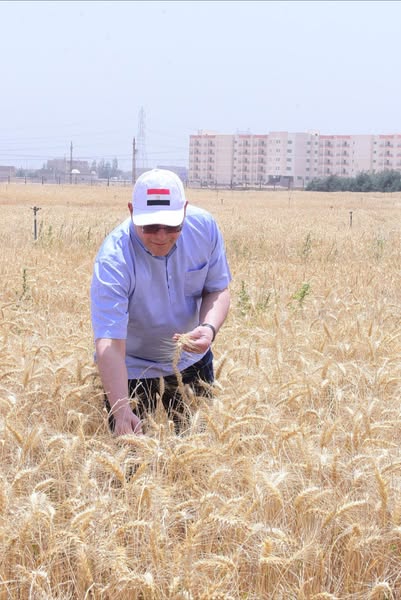This morning, Dr. Hassan Al-Numani, President of Sohag University, joined the workers and farmers at the university’s farm in Al-Kawthar district for breakfast in a warm and friendly rural atmosphere filled with simplicity, greenery, and fresh air. The gathering took place before beginning the wheat harvest at the university farm. He was accompanied by Dr. Abdel Nasser Yousif, Vice President for Education and Student Affairs; Mr. Ashraf Al-Qadi, University Secretary-General; Major General Tarek Hafez, Director of University Security; Dr. Khalaf Hammam, Dean of the Faculty of Agriculture; Dr. Hazem Al-Mashnib, Dean of the Faculty of Science; Dr. Mohamed Orabi, Director of the Agricultural Research Center and General Supervisor of the university farms; along with a group of faculty members and staff from the college and the farm.
After breakfast, the university president inspected the harvesting and threshing operations of the certified wheat variety “Sids 12”, grown on an area of 22 acres. He had previously participated last week in the harvesting of another 22 acres of wheat at the university’s farm in New Sohag City, bringing the total harvested wheat area to 44 acres.
He praised the role of the university’s farms in Al-Kawthar and New Sohag in serving the local community through their contribution to food security and sustainable agricultural production. The farms provide high-quality, high-yield crops at cost price, as well as animal and poultry products that help meet community needs. This effort aligns with the Sustainable Development Goals and Egypt’s Vision 2030, while promoting crop varieties that are heat-tolerant and adaptable to climate change.
Dr. Khalaf Hammam noted that the improved wheat seeds are in high demand among farmers and those involved in wheat cultivation across the governorate due to their quality and productivity. He thanked the faculty leadership for their ongoing efforts to develop the university’s farms through modern scientific methods and advanced agricultural techniques, leading to significant improvements in both crop and livestock production. He also emphasized the training programs and advisory services provided to enhance the skills of local farmers and agricultural workers.
Dr. Hazem Al-Mashnib added that the cultivated area includes 22 acres of wheat, 11 acres of barley, and 19 acres of clover. The president’s tour also included an inspection of the farm’s palm trees, alfalfa, okra crops, greenhouses for peppers and cucumbers, and fruit tree seedlings.

